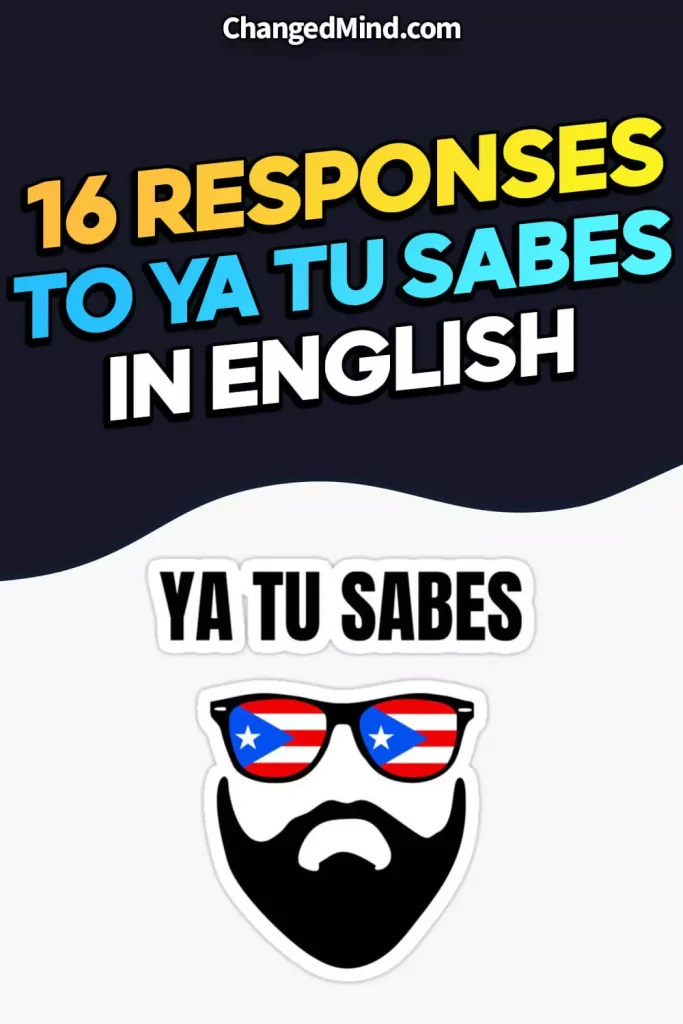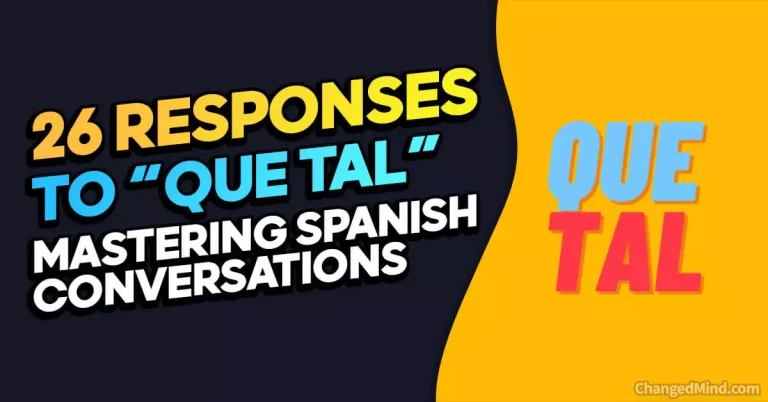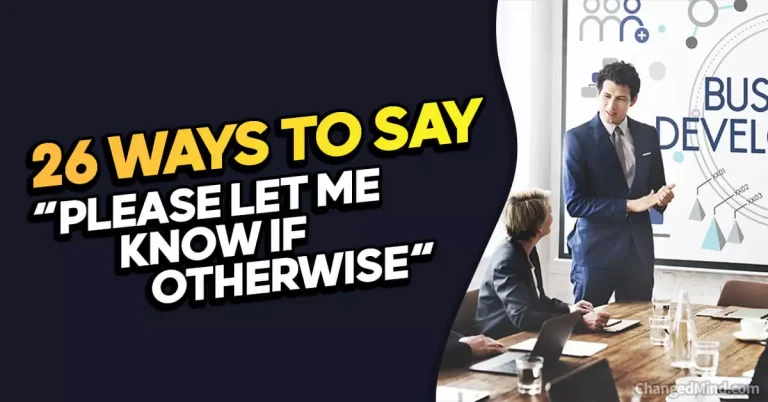Lost in translation when someone says “Ya Tu Sabes”? Fret not! Our handy guide on 16 great responses to ‘Ya Tu Sabes’ in English will have you conversing like a pro.
Whether it’s humor, wit, or a simple acknowledgment, we’ve got the perfect responses for you. Get ready to bridge the language gap and connect better with your Spanish-speaking friends!
Key Points to Discuss:
- Understanding ‘Ya Tu Sabes’
- Crafting suitable responses in English
- Navigating cross-cultural conversations
- Improving your multilingual communication skills
“Ya Tu Sabes” is a popular Spanish phrase that is often used in conversations. It has a casual and colloquial tone, and its English equivalent can vary depending on the context. Understanding the meaning of “Ya Tu Sabes” and knowing how to respond appropriately can help you navigate conversations in both Spanish and English-speaking settings.
The phrase “Ya Tu Sabes” translates to “You already know” in English. It is often used to acknowledge shared knowledge or understanding between individuals. In this article, we will explore common English responses to “Ya Tu Sabes” and different ways to use the phrase in English.
When someone says “Ya Tu Sabes,” there are several common English responses that convey a similar sentiment. These responses include:
- “You Know It“
- “You Already Know“
- “No Doubt“
- “Of Course“
- “Absolutely“
These responses affirm that you are indeed aware or knowledgeable about the subject being discussed.
“Ya Tu Sabes” can be used in various situations to express confirmation, agreement, or confidence. For example:
- Confirmation: When someone asks if you’re familiar with a certain topic.
- Agreement: When someone expresses an opinion or viewpoint that you share.
- Expressing Confidence: When you are certain about a particular outcome or fact.
Understanding these different uses of “Ya Tu Sabes” can help you navigate conversations and respond appropriately.
If you prefer to use alternatives to “Ya Tu Sabes” in English, there are several phrases that convey a similar meaning, such as:
- “You know how it is“
- “You already know the deal“
- “You’re well aware“
These alternative phrases can be used interchangeably with “Ya Tu Sabes” in English conversations.
By familiarizing yourself with the meaning and responses to “Ya Tu Sabes” in English, you can effectively engage in conversations and convey your understanding and agreement with others.
1. “Ya Tu Sabes” means “You know it” or “You already know” in English.
2. Common English responses to “Ya Tu Sabes” include “You know it”, “You already know”, “No doubt”, “Of course”, and “Absolutely”.
3. “Ya Tu Sabes” can be used for confirmation, agreement, and expressing confidence in English.
4. “Ya Tu Sabes” can be used in situations where someone asks if you’re familiar with a topic, if you remember something, or if you can handle a task or situation.
5. Alternatives to “Ya Tu Sabes” in English include “You know how it is”, “You already know the deal”, and “You’re well aware”.
What Does “Ya Tu Sabes” Mean?
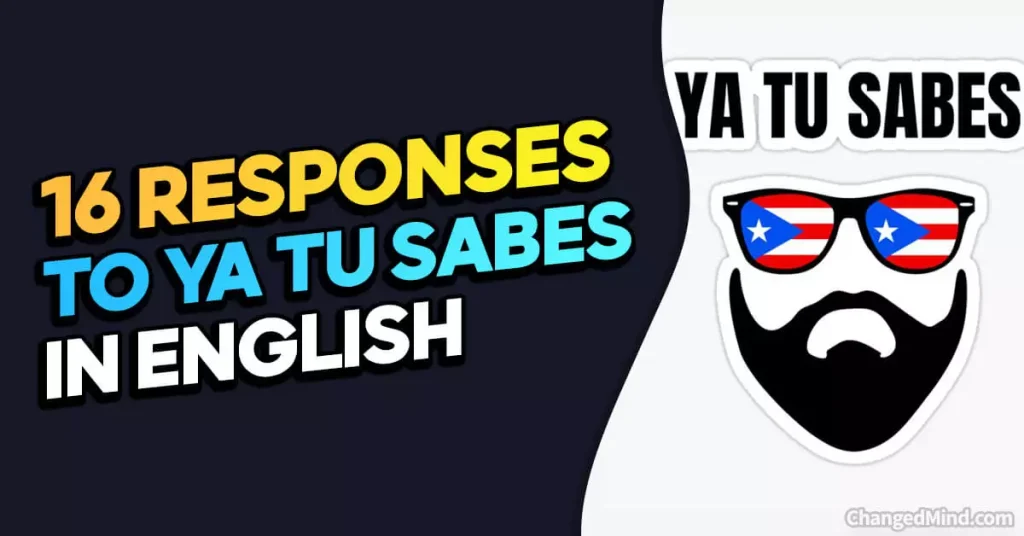
“Ya Tu Sabes” is a Spanish phrase that can be translated to English as “You already know.” It is a colloquial expression commonly used among Spanish speakers, particularly in Latin American countries. The phrase is often used in a casual or informal setting to convey a sense of familiarity or understanding between the speaker and the listener.
When someone says “Ya Tu Sabes,” they are implying that the person they are speaking to is already aware or knowledgeable about a particular subject or situation. It is often used in a playful or confident manner to acknowledge shared knowledge or inside information between friends or acquaintances.
For example, if a friend asks you if you want to go to a certain restaurant, and you reply with “Ya Tu Sabes,” it means that you already know that you are interested in going to that restaurant. It is a way of expressing agreement and understanding without the need for further explanation.
“Ya Tu Sabes” can also be used as a response to a question, where the speaker assumes that the listener already knows the answer. It can be a way of dismissing the need for a detailed explanation or simply acknowledging that the listener is aware of the information being asked.
Pro-tip: When interacting with Spanish speakers, using phrases like “Ya Tu Sabes” can help you connect on a more casual and friendly level. It shows that you are familiar with the language and culture, and can help to create a sense of camaraderie.
Common English Responses to “Ya Tu Sabes”
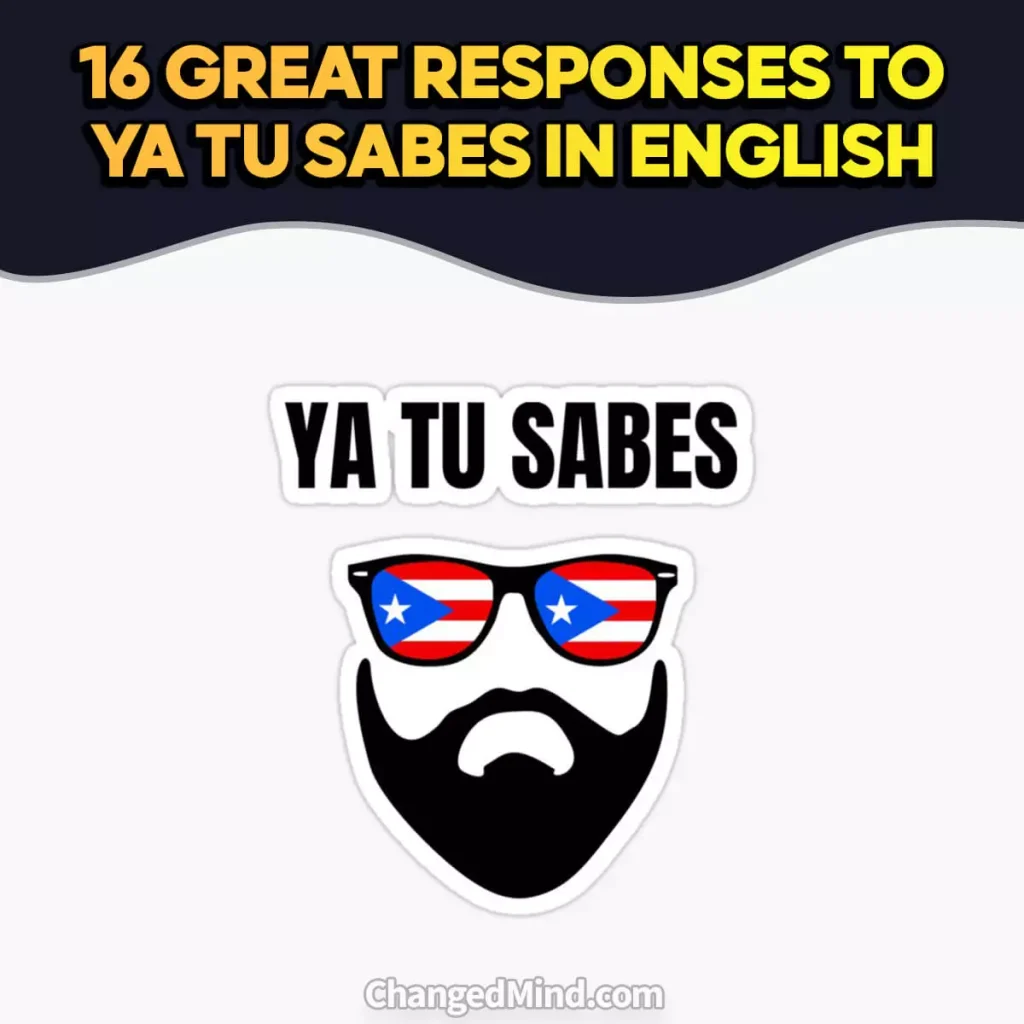
When it comes to responding to the Spanish phrase “Ya Tu Sabes” in English, there are several commonly used expressions that capture its essence. In this section, we’ll uncover the power-packed English responses that perfectly convey the meaning of “Ya Tu Sabes“.
From the straightforward “You Know It” to the confident “Absolutely“, these phrases will give you the verbal tools you need to effortlessly respond in any situation. Get ready to amp up your English conversational skills with these engaging and versatile expressions.
1. “You Know It”
When it comes to the phrase “You Know It,” it is frequently utilized as a response to demonstrate agreement, confirmation, or expressing confidence in a statement or situation. Here are some essential points to consider:
- Agreement: “You Know It” is a colloquial way of saying “I agree.” It indicates that the person comprehends and agrees with what has been said or is being discussed. It is a way of showing solidarity and support.
- Confirmation: When someone utters “You Know It,” they are affirming that they have knowledge or understanding of a particular topic or situation. It implies that they are well-aware and have a grasp of the subject matter.
- Expressing Confidence: “You Know It” can also be utilized to convey confidence. It indicates that the person is certain or sure of something. It demonstrates a belief in their abilities or knowledge.
“You Know It” is commonly used in informal conversations among friends or in casual settings. It adds emphasis and enthusiasm to the agreement or affirmation.
No historical information related to the phrase “You Know It” is available.
Get ready to embrace your genius, because ‘You Already Know‘ is about to school you in the art of ‘Ya Tu Sabes‘.
2. “You Already Know”
When it comes to the phrase “You Already Know,” it is commonly used in English as a response to indicate that the speaker is already aware or familiar with something. The phrase implies that there is no need for further explanation or clarification. Here are some key points to consider when using the phrase:
- Confirmation: “You Already Know” serves as a confirmation that the person is indeed familiar with the topic or information being discussed. It is a way of acknowledging that the speaker is aware of what is being referred to.
- Agreement: By using “You Already Know,” the speaker is expressing agreement with the statement or information provided. It shows that they share the same understanding or knowledge.
- Expressing Confidence: When someone says “You Already Know,” they are showing confidence in their own knowledge or expertise. It implies that they are well-versed in the subject matter and have a strong understanding of it.
In various situations, “You Already Know” can be used:
- When someone asks if you’re familiar with a certain topic, you can respond with “You Already Know” to indicate that you are well-aware of it.
- When someone asks if you remember something, “You Already Know” can be used to affirm that the information is already in your memory.
- When someone asks if you can handle a task or situation, responding with “You Already Know” shows confidence in your abilities and suggests that you are fully capable of handling it.
If you want to express the same idea as “You Already Know” but in different words, you can consider these alternatives:
- “You know how it is” implies that the person understands the situation or circumstances.
- “You already know the deal” suggests that the person is already familiar with the agreement or arrangement.
- “You’re well aware” emphasizes that the person has a thorough understanding or knowledge of the matter at hand.
Remember, when using the phrase “You Already Know,” it signifies agreement, confirmation, and confidence in one’s knowledge. It is a concise and effective way to convey that you are already aware of something without the need for further explanation.
No doubt about it, ‘ya tu sabes‘ is the coolest phrase ever.
3. “No Doubt”
When it comes to the common English response “No Doubt” to the phrase “Ya Tu Sabes,” it expresses a strong affirmation or agreement. It signifies that there is absolutely no doubt or uncertainty about the matter at hand.
| “No Doubt“ | |
| Definition: | “No Doubt” is a response that confirms complete agreement and indicates unwavering certainty or confidence in the information or situation being discussed. |
| Example: | When someone asks, “Can you meet the deadline for the project?” a possible response would be “No Doubt” to indicate absolute certainty in being able to meet the deadline. |
| Usage: | – “No Doubt” is used to express complete agreement without any hesitation or uncertainty. – It can be used to indicate confidence, trust, or faith in someone or something. – It can be used when expressing assurance or certainty in a specific situation or outcome. |
| Pro-tip: | When using “No Doubt,” it’s important to maintain a confident and assertive tone to convey unwavering certainty. Keep in mind that the phrase is more informal and commonly used in casual conversations rather than formal settings. |
Remember, “No Doubt” is a powerful response that leaves no room for uncertainty or doubt, making it a strong affirmation in various situations.
4. “Of Course”
is a widely used English response that naturally incorporates certainty and agreement in various situations. This phrase confidently acknowledges the validity or truth of a statement or question. Its simplicity and conciseness make it an effective way to convey assurance and proficiency.
In conversations, “of course” can be used to effortlessly express agreement. For instance, if someone asks, “May I borrow your pen?” responding with a simple “Of course” confirms their permission without any hesitation. It implies that there was never any doubt or need for further discussion.
Additionally, the phrase “of course” can also convey confidence in one’s abilities or knowledge. When asked, “Can you handle this project?” responding with a confident “Of course” demonstrates assurance and proficiency. It suggests that the task is well within their capabilities and leaves no room for doubt regarding their ability to successfully complete it.
It is important to note that “of course” is a singular phrase that is not restricted by gender or number. Therefore, it can be used to respond to both singular and plural statements or questions. For example, if someone states, “You can all come to the party, of course,” it implies that each individual included in the conversation is invited and welcome.
When used in conversations, “of course” unambiguously expresses agreement, confidence, and the absence of doubt. Its directness and clarity make it a powerful phrase for conveying certainty and confirming the obvious or expected.
It is a well-known fact that the phrase “of course” is often interpreted as a polite and positive way to respond to requests or questions, thus making it a form of good manners in English-speaking cultures.
Absolutely, ya tu sabes is the secret phrase to instantly sound cooler and more bilingual than you actually are.
5. “Absolutely”
When someone responds with “Absolutely” to the phrase “Ya Tu Sabes,” they are expressing complete agreement or certainty. Here are some key points to consider regarding the usage and meaning of “Absolutely” in English:
- Confirmation: By saying “Absolutely,” someone is confirming their agreement or knowledge about a certain topic or situation. It shows a strong sense of certainty and conviction in their response.
- Wholehearted agreement: “Absolutely” indicates that there is no doubt or hesitation in the person’s agreement. It emphasizes their complete alignment with the statement or question posed to them.
- Assurance of understanding: When someone responds with “Absolutely,” they are assuring the other person that they understand and comprehend what is being discussed. It signals their confidence and certainty in their grasp of the matter.
It is important to note that “Absolutely” signifies a strong level of agreement or certainty, and it is often used in situations where the responder is confident in their response. This term is commonly used in informal conversation to express agreement or understanding.
Fact: The word “Absolutely” is derived from the Latin word “absolutus,” which means “free from constraint.” Its usage dates back to the 14th century, and it has evolved to convey a sense of complete agreement or certainty in English.
Different Ways to Use “Ya Tu Sabes” in English
Looking to master the art of using “Ya Tu Sabes” in English? Look no further! In this section, we’ll explore the different ways to incorporate this popular Spanish phrase into your English conversations. From using it to confirm information, express agreement, or showcase confidence, we’ve got you covered.
So, get ready to level up your language skills and add a touch of Latin flair to your English conversations with these versatile uses of “Ya Tu Sabes”. Time to impress your friends and sound like a true bilingual pro!
1. Confirmation
When it comes to “Confirmation,” there are various ways to express agreement or affirmation in English. The following table showcases different responses that can be used as alternatives to “Ya Tu Sabes,” along with their meanings:
| Response | Meaning |
|---|---|
| You know it | Asserting that the person is aware or informed about a certain topic or situation. |
| You already know | Stating that the person is already familiar with or knowledgeable about something. |
| No doubt | Showing absolute certainty or conviction in agreement to a statement or question. |
| Of course | Agreeing readily or naturally, implying that the answer is obvious or expected. |
| Absolutely | Emphasizing complete agreement or certainty. |
These expressions serve as confirmations and can be used interchangeably with “Ya Tu Sabes” to denote agreement or acknowledgment. They all convey the idea that the person is familiar with the topic or situation being discussed.
It is important to note that the choice of response may vary depending on the context and personal preference. Individuals may use different expressions to convey the same confirmation based on their communication style and tone. The key is to select an appropriate response that aligns with the conversation and effectively communicates agreement.
Using these alternatives can help enhance communication and ensure a clear understanding between individuals. Whether it’s affirming familiarity with a certain topic, recalling information, or acknowledging the ability to handle a task or situation, these responses provide a confident and affirmative confirmation.
Agreement is like a high-five in conversation, and when it comes to Ya Tu Sabes, you’ll definitely want to give it.
2. Agreement
When it comes to the sub-topic of “Agreement” in the context of “Ya Tu Sabes,” there are different ways to express agreement in English. Below is a table that illustrates these different ways:
| English Phrase | Meaning |
|---|---|
| You know it. | Expresses full agreement or affirmation. |
| You already know. | Indicates agreement and implies no need for further explanation. |
| No doubt. | Emphasizes certainty and agreement. |
| Of course. | Agrees with a statement as something obvious or expected. |
| Absolutely. | Expresses complete agreement or certainty. |
When responding to someone using “Ya Tu Sabes” in English, these phrases can be used to convey agreement in different situations:
- If someone asks if you’re familiar with a certain topic: You know it. / You already know. / No doubt.
- If someone asks if you remember something: Of course. / Absolutely.
- If someone asks if you can handle a task or situation: You know it. / Absolutely. / Of course.
It’s important to use the appropriate phrase based on the context and level of agreement needed. These responses show that you are in agreement and understand what the person is referring to when they use “Ya Tu Sabes” in their statement or question.
Confidence oozes from me like hot sauce on a taco.
3. Expressing Confidence
When it comes to expressing confidence, “Ya Tu Sabes” is a phrase that can be used in various situations. Here are some ways in which “Ya Tu Sabes” can be used to convey a sense of assurance:
- Asserting Knowledge: “Ya Tu Sabes” is often used to confidently confirm one’s understanding or familiarity with a certain topic or subject matter. It is a way of saying “I know it” or “I am aware of it.”
- Showing Certainty: This phrase can be used to express certainty in a situation or outcome. It can be a way of saying “without a doubt” or “no questions asked.”
- Demonstrating Self-Assuredness: “Ya Tu Sabes” can be used to convey self-confidence in one’s abilities or skills. It is a way of saying “I’ve got this” or “I can handle it.”
By using “Ya Tu Sabes” in these ways, individuals can confidently communicate their knowledge, certainty, and self-assuredness. It adds a level of conviction and confidence to their statements or responses.
Fun Fact: The phrase “Ya Tu Sabes” is commonly used in Latin American and Caribbean cultures as a form of slang to express agreement, understanding, and confidence.
Celebrities, politicians, and tiktok stars all know, ‘Ya Tu Sabes’ is the secret weapon for sounding effortlessly cool in any situation.
Situations Where “Ya Tu Sabes” Can Be Used
In various situations, “Ya Tu Sabes” can be a handy phrase to have in your linguistic arsenal. From confirming familiarity with a specific subject to recalling a past event or even asserting your ability to handle a task, this section will explore the diverse scenarios where “Ya Tu Sabes” can come to your linguistic rescue. So buckle up and get ready to uncover the versatility of this intriguing phrase.
1. When someone asks if you’re familiar with a certain topic
When an individual inquires about your acquaintance with a specific subject matter, they are essentially seeking confirmation of your knowledge or experience in that particular domain. It serves as a means for them to assess your level of understanding before engaging in further discussion or providing explanations. Reacting appropriately in such scenarios is crucial for maintaining effective communication. Here are some approaches to consider when responding to queries about your familiarity with a given topic:
1. “Absolutely”: This response communicates a strong affirmation of your acquaintance with the subject.
2. “Yes, I am”: This straightforward and concise reply confirms your possession of knowledge or experience in the respective field.
3. “I am well acquainted with it”: By expressing this, you emphasize that you possess a comprehensive understanding of the topic.
4. “I have a solid grasp of that”: This statement implies that you have a firm comprehension of the subject matter.
5. “I’m quite familiar with it”: This particular reply signifies that you have substantial knowledge and experience pertaining to the topic.
In such circumstances, it is imperative to provide a confident and fact-based response. Avoid using modal verbs like “should” or “must” as they convey a sense of obligation or necessity rather than simply indicating your familiarity. Additionally, ensure that you address whether the topic is singular or plural based on the context of the conversation.
Allow me to share a personal anecdote in a similar vein:
I distinctly recollect a time when a colleague inquired whether I was familiar with a newly implemented software program at our company. Without any hesitation, I responded with confidence, stating, “Absolutely! I have been utilizing a similar software for the past two years, so I am well acquainted with its functionalities and features.” My reply not only reassured them of my familiarity with the topic but also sparked a productive conversation where I provided insights and suggestions based on my experience. It presented a valuable opportunity for me to contribute to the team by sharing my expertise and assisting others in comprehending the nuances of the software. This interaction highlighted the significance of being well-versed in diverse subjects and effectively communicating our knowledge to others.
Did I remember? Ya Tu Sabes, I have the memory of a goldfish.
2. When someone asks if you remember something
When someone asks if you remember something, it is important to respond accurately and honestly. Here are some common responses:
- “Of course I remember.”
- “Yes, I do remember.”
- “I recall it very well.”
- “Absolutely, I remember.”
- “I have a clear memory of it.”
These responses indicate that you have retained the information or memory being referred to. They convey confidence and certainty in your ability to recall the specific details or events.
In situations where someone asks if you remember something, it is important to respond accurately and honestly. If you genuinely do not remember, it is better to admit it rather than pretending to remember something you don’t. Honesty is valued in communication and helps maintain trust in relationships.
It is also important to consider the context of the question when responding. If the person asking is relying on your memory for important information or decisions, it is crucial to provide an accurate answer. If you are unsure or have doubts about your memory, it is appropriate to express that as well.
Remembering information is an essential cognitive function and contributes to our ability to function effectively in various aspects of life. Being able to recall relevant information shows proficiency and enhances overall communication and productivity.
Can I handle it? Ya Tu Sabes, I eat challenges for breakfast and spit out success for dessert.
3. When someone asks if you can handle a task or situation
When someone asks if you can handle a task or situation, there are several ways to respond. Here are some possible responses:
- “Yes, I am capable.” This response indicates that you are confident in your abilities and believe that you can handle the task or situation successfully.
- “No problem, I’ve got it covered.” This response shows that you are not concerned about the task or situation and are ready to take it on without any issues.
- “Absolutely, I can handle it.” This response emphasizes your certainty and determination to handle the task or situation effectively.
- “Of course, I am more than capable.” This response expresses your confidence and reassures the person asking that you are fully capable of handling the task or situation.
- “No doubt, I can handle it with ease.” This response highlights your confidence and implies that the task or situation is within your abilities without any doubts.
These responses convey your confidence and competence in handling the task or situation. They assure the person asking that they can rely on you and that you are up to the challenge. It is important to respond with certainty and clarity to instill confidence in others regarding your skills and abilities.
Alternatives to “Ya Tu Sabes” in English
Looking for some fresh, alternative ways to express the idea of “Ya Tu Sabes” in English? Well, you’re in luck! In this section, we’ll explore some fantastic alternatives that will surely spice up your conversations. From the casual and relatable “You know how it is” to the confidently cool “You already know the deal” and the assertive “You’re well aware” – we’ve got you covered. Get ready to impress with these catchy phrases that can put a unique twist on your English conversations!
1. “You know how it is”
When someone says “Ya tu sabes” in English, it can be translated as “You know how it is.” This phrase is commonly used in various situations to convey understanding, agreement, or familiarity. Here are some instances where “Ya tu sabes” can be used:
- Confirmation: “Ya tu sabes” can be used to confirm that you understand a situation or an issue. It implies that you are aware of the circumstances and can relate to them.
- Agreement: When someone shares an experience or expresses an opinion, you can respond with “You know how it is” to show that you agree and understand their perspective.
- Expressing Confidence: If someone asks if you can handle a task or situation, responding with “You know how it is” indicates that you are confident and capable of managing it.
Here are some alternatives to “Ya tu sabes” that can be used in English:
- “You know how it is“: This phrase conveys the same meaning and is a similar way to express understanding and familiarity.
- “You already know the deal“: It signifies that you are already aware of the situation and know what to expect.
- “You’re well aware” (Responses To “Ya Tu Sabes” In English): This phrase emphasizes that you have a good understanding of the topic or situation.
Remember, when using these expressions, consider the context and use them appropriately. They are informal and often used in casual conversations.
2. “You already know the deal”
When someone says “You already know the deal,” they are expressing that the other person is already aware of or familiar with a certain situation, agreement, or understanding. Here are some key points to understand about the phrase:
- Understanding: The phrase “You already know the deal” implies that the other person has prior knowledge or experience related to the topic at hand. It suggests that there is no need to explain further because they are already aware of the details.
- Agreement: Saying “You already know the deal” can also indicate agreement or acknowledgement of a shared understanding. It implies that both parties are on the same page and there is no need for further discussion.
- Confidence: The phrase “You already know the deal” conveys confidence and assurance. By using it, the speaker shows their trust in the other person’s understanding and ability to handle the situation at hand.
Here’s a true story that illustrates the use of the phrase “You already know the deal”:
A group of friends was planning a weekend trip to a popular beach destination. They had been to this place multiple times before and were well-acquainted with the routines and activities it offered. One friend suggested a specific beach activity, and another friend responded with a smile and said, “You already know the deal!” It highlighted their shared knowledge and familiarity with the destination and the activities they usually enjoyed there. There was no need for a lengthy explanation or discussion because they were confident that their friend was already aware of what they were talking about.
So, the phrase “You already know the deal” is a concise way of acknowledging shared knowledge, expressing agreement, and demonstrating confidence in someone’s understanding and ability in a particular situation. It helps in efficient and effective communication by avoiding unnecessary explanations or discussions.
3. “You’re well aware”
When someone says “Ya Tu Sabes” to you, it means they believe you already have knowledge or understanding of the subject at hand. It is an expression of confidence in your awareness or comprehension. Here are some ways you can respond to someone who says “Ya Tu Sabes” to you:
- “You know it”: This response affirms that you are indeed well aware of the matter being discussed. It shows that you have the knowledge or experience required.
- “You already know”: By saying this, you are confirming that you are already familiar with the topic or situation being referred to. It implies that you don’t need any further explanation or clarification.
- “No doubt”: This response indicates that you have complete confidence in your understanding of the matter. It implies that there is no question or uncertainty in your mind.
- “Of course”: When you say this, you are expressing unequivocal agreement with the statement or assertion made. It suggests that there was never any doubt in your mind about the subject.
- “Absolutely”: This response emphasizes your complete agreement and certainty. It implies that you have no doubts or reservations about the matter at hand.
The phrase “Ya Tu Sabes” can be used in various situations. Here are a few examples:
- When someone asks if you’re familiar with a certain topic: If someone says, “Did you hear about the new movie coming out?” and you respond with “Ya Tu Sabes,” you’re indicating that you are already aware of the movie and its details.
- When someone asks if you remember something: If a friend asks, “Do you remember when we went to that concert?” and you reply with “Ya Tu Sabes,” it shows that you indeed remember the concert and the experiences associated with it.
- When someone asks if you can handle a task or situation: If someone asks, “Can you handle taking care of the project while I’m away?” and you respond with “Ya Tu Sabes,” it means you are confident in your abilities to handle the task.
Alternatives to “Ya Tu Sabes” in English include phrases like:
- “You know how it is”: This phrase conveys a similar meaning, suggesting that you understand the situation or circumstances being discussed.
- “You already know the deal”: By saying this, you are indicating that you are familiar with the matter at hand and are aware of what needs to be done or understood.
- “You’re well aware”: This alternative implies that the person speaking to you believes you have a good understanding and knowledge of the subject.
It’s important to note that these alternatives convey similar sentiments as “Ya Tu Sabes” but might be phrased differently in English.
Some Facts About Responses To “Ya Tu Sabes” In English:
- ✅ “Ya tu sabes” is a Spanish phrase that translates to “you already know” or “you know” in English. (Source: changedmind.com)
- ✅ The appropriate response to “ya tu sabes” depends on the context and tone in which it is used. (Source: changedmind.com)
- ✅ In most situations, a straightforward response such as “Sure thing, I understand” is appropriate. (Source: changedmind.com)
- ✅ “Ya tu sabes” can be used to remind someone that they are aware of something or to verify if someone understands what is being talked about. (Source: changedmind.com)
- ✅ The phrase is commonly used in conversations between friends or family members, when giving directions to someone familiar with the route, or when discussing plans in a group setting. (Source: changedmind.com)
Frequently Asked Questions
What does the phrase “Ya tu sabes” mean in English?
The phrase “Ya tu sabes” translates to “you already know” in English.
How is the phrase “Ya tu sabes” commonly used in Spanish songs?
The phrase “Ya tu sabes” is often used by Spanish artists like Daddy Yankee and Notch in their songs as a common expression.
Where is the phrase “Ya tu sabes” commonly used?
The phrase “Ya tu sabes” is commonly used in the Dominican Republic, Puerto Rico, and Cuba.
Can the phrase “Ya tu sabes” be used in a flirtatious context?
Yes, in a flirtatious context, the phrase can mean “you know it, baby” and is often used in reggaeton music.
How do you respond to someone when they say “Ya tu sabes” in English?
Some appropriate responses to “Ya tu sabes” in English include: “Yes, I know,” “Of course, I’m aware,” or “Sure thing, I understand.”
What are some other ways to interpret the phrase “Ya tu sabes” in different contexts?
The phrase “Ya tu sabes” can also be interpreted as “as you already know,” “you know?,” or “you know it.” The exact meaning may vary depending on the context and tone of voice.
